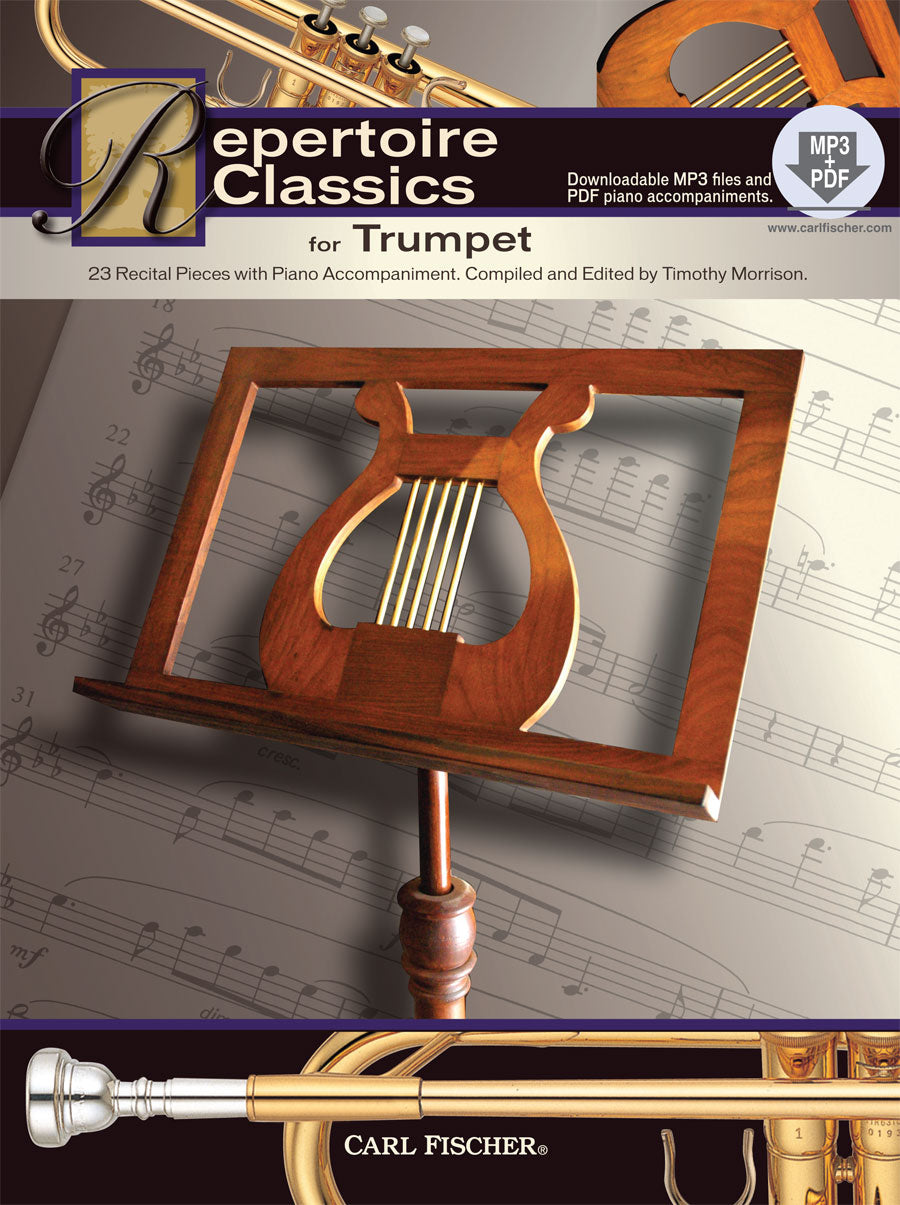Repertoire Classics for Trumpet
Expected to ship in 1-2 weeks.
- Composers: George Frideric Handel (1685-1759), Wolfgang Amadeus Mozart (1756-1791), Johann Sebastian Bach (1685-1750), Benjamin Godard (1849-1895), Georges Bizet (1838-1875), Herbert L. Clarke (1867-1945), Camille Saint-Saëns (1835-1921), Antonín Dvořák (1841-1904), Harry Hartlett, Giulio Alary (1814-1891), Arthur Olaf Andersen (1880-1958), James Burke, Antonin De Boeck, Bernard Fitzgerald, Edwin Franko Goldman (1878-1956), Jean-Baptiste Arban (1825-1889), Jules Levy (1838-1903), Edward Llewellyn, T.V. Short, Leonard B. Smith (1915-2002), H. A. Vander Cook
- Format: Book & Audio Access
- Instrumentation: Trumpet
- ISBN:
- Size: 9.1 x 11.9 inches
Description
Carl Fischer's Repertoire Classics series consists of comprehensive and progressively graded collections of classic solos with piano accompaniment. Each book contains a fine mix of transcriptions of familiar classics along with solos written specifically for the instrument. Many of the pieces in these collections appear on state contest/festival required music lists. The pieces featured cover the performance levels of grade 2 through 5, representing all style periods, and include works by some of the greatest composers of all time. As an added bonus, the included MP3 audio files of the piano accompaniments to make practicing more fun. It also contains piano accompaniment parts for all pieces in the collection in PDF format. Our innovative and unique packaging allows Carl Fischer Music to provide you with large and useful collections of solo literature at affordable prices, and players will find them useful for years to come.
Contents:
Contest Piece ( Morceau de Concours, Op. 57)- Alary, Giulio
A Glad Tune- Andersen, Arthur Olaf
Fantaisie and Variations on The Carnival of Venice- Arban, Jean- Baptiste
Arioso (from Cantata No. 156)- Bach, Johann Sebastian
Habanera (from the Opera Carmen)- Bizet, Georges
The Magic Trumpet ( A Beguine) - Burke, James F.
Supremacy of Right ( Grand March) - Clarke, Herbert L.
Allegro ( Allegro de Concours)- De Boeck, Antonin
Humoreske, Op. 101, No. 7 - Dvořák, Antonín
Call ( from Modern Suite) - Fitzgerald, Bernard
Frolic ( from Modern Suite) - Fitzgerald, Bernard
Berceuse ( from the Opera Jocelyn) - Godard, Benjamin
The Rainbow (Gavotte)- Goldman, Edwin Franko
Largo from the Opera Xerxes- Handel, George Friederic
Gaiety Polka- Hartlet, Harry
Grand Russian Fantasia ( Theme and Variations) - Levy, J
My Regards ( Waltz)- Llewellyn, Edward
Concerto for Trumpet ( First and Second Movements)- Mozart, Leopold
My Heart at Thy Sweet Voice from the Opera Samson et Dalila- Saint- Saens, Camille
Maud ( Valse Brillante)- Short, T.V.
Ecstasy (Waltz)- Smith, Leonard B.
Dewdrops (Polka) - Vander Cook, H.A.
Lilacs (Polka)- Vander Cook, H.A.
Publishers use a lot of words to describe what they sell, and we know it can be confusing. We've tried to be as clear as possible to make sure you get exactly what you are looking for. Below are descriptions of the terms that we use to describe the various formats that music often comes in.
Choral Score
A score for vocalists that only contains the vocal lines. The instrumental parts are not there for reference. Generally, cheaper than a vocal score and requires multiple copies for purchase.
Facsimile
Reproductions of the original hand-written scores from the composer.
Full Score
For ensemble music, this indicates that the edition contains all parts on a single system (there are not separate parts for each player). In larger ensembles, this is for the conductor.
Hardcover
Hardbound. Generally either linen-covered or half-leather.
Orchestral Parts
Similar to a wind set, this is a collection of parts. In the case of strings, the numbers listed are the number of copies included, though generally these are available individually (often with minimum quantities required).
Paperback
When publishers offer multiple bindings (e.g. hardcover) or study scores, this is the "standard" version. If you're planning to play the music, this is probably what you want.
Performance / Playing Score
A score of the music containing all parts on one system, intended for players to share. There are not separate parts for each player.
Set of Parts
For ensemble music, this indicates that there are separate individual parts for each player.
Solo Part with Piano Reduction
For solo pieces with orchestra, this is a version that contains a piano reduction of the orchestra parts. For piano pieces, two copies are typically needed for performance.
Study Score
A small (think choral size) copy of the complete score meant for studying, and not playing. They make great add-ons when learning concertos and small chamber works.
Vocal Score
A score prepared for vocalists that includes the piano/organ part or a reduction of the instrumental parts.
Wind Set
For orchestral music, this is a collection of wind and percussion parts. The specific quantities of each instrument are notated.
With Audio
In addition to the printed music, the edition contains recordings of the pieces. This may be an included CD, or access to files on the internet.
With / Without Fingering (Markings)
Some publishers prepare two copies - a pure Urtext edition that includes no fingering (or bowing) suggestions and a lightly edited version that includes a minimal number of editorial markings.


